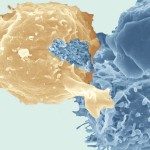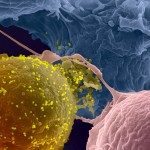Link to Pubmed [PMID] – 29577666
Link to DOI – 10.1002/adhm.201701059
Adv Healthc Mater 2018 Jun; 7(11): e1701059
Bioconjugation of enzymes on coatings based on polydopamine (PDA) layers is an appealing approach to control biological responses on biomedical implant surfaces. As alternative to PDA wet deposition, a fast, solvent-free, and dynamic deposition approach based on atmospheric-pressure plasma dielectric barrier discharge process is considered to deposit on metallic surfaces acrylic-based interlayers containing highly chemically reactive catechol/quinone groups. A biomimetic approach based on covalent immobilization of Dispersin B, an enzyme with antibiofilm properties, shows the bioconjugation potential of the novel plasma polymer layers. The excellent antibiofilm activity against Staphylococcus epidermidis is comparable to the PDA-based layers prepared by wet chemical methods with slow deposition rates. A study of preosteoblastic MG-63 human cell line viability and adhesion properties on plasma polymer layers demonstrates early interaction required for biomedical applications.


